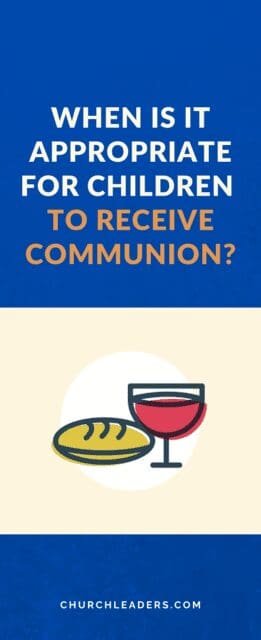Communion for Kids (cont.)
Recently, some have suggested that God wants us to bring infants to the table because they’re members of His covenant family. The problem with paedocommunion is that it changes the sacrament’s nature and lays aside the clear teaching of 1 Corinthians 11:27-32.
Paedocommunion seems to be a simple solution to the problem of knowing when to admit children to receive communion. But it lacks biblical support, any substantial place in church history, and de facto leads to the conclusion that the sacrament works ex opere operato. (In other words, that the sacrament works out of itself irrespective of whether or not the infant is examining himself or herself and so exercising faith when they partake.)
In addition, paedocommunion demands changing the symbolism of the elements (the separation of the bread and wine symbolizing the separation of Jesus’ blood and body) because an infant cannot chew or swallow bread. Giving infants the Lord’s Supper demands the unbiblical practice of intinction.
Many churches prepare children to receive communion with confirmation class. The upside is that confirmation can give our covenant children the biblical and theological instruction to mature them in faith. The downside is that confirmation can treat all children as if they’re at the same stage of spiritual development.
A confirmation class risks giving assurance of salvation to unregenerate youth. They may have “made it through” a class in which they’ve merely grown in assent to theological truths.
Nevertheless, all churches should be intentional about incorporating biblical teaching and memorization of a catechism into Sunday School classes. That will help prepare children for coming to the table.
Talking to Parents About Communion for Kids
I’ve often met with the parents of a very young child about whether to bring their child before the elders for examination. I generally ask the child questions about Christianity. For example: “Who is God? What is God like? How many persons are in the Godhead? Who is Jesus? Is Jesus God or man? How did God make you? What happened to Adam and Eve? What do you deserve for your sins? At the cross, what did Jesus do?” etc.
A fairly serious lack of knowledge about basic Christian truth tends to surface. At that point, I try to meet with just the parents. Then I encourage them to continue fanning the flame of faith in their child’s heart and life.
Next, I tell them to meet with me again in the near future to see whether the child’s mind has developed into maturity. Pastors should proceed cautiously before bringing very young children to elders for examination. The elders may conclude that a particular child isn’t mature enough to examine himself or herself in light of Scripture.
When this occurs, we risk doing harm to the child’s assurance of salvation. If they’re sincerely regenerate — but simply not mature enough to examine themselves — they may think we’re telling them they aren’t regenerate. So we must exercise great caution with this approach.


